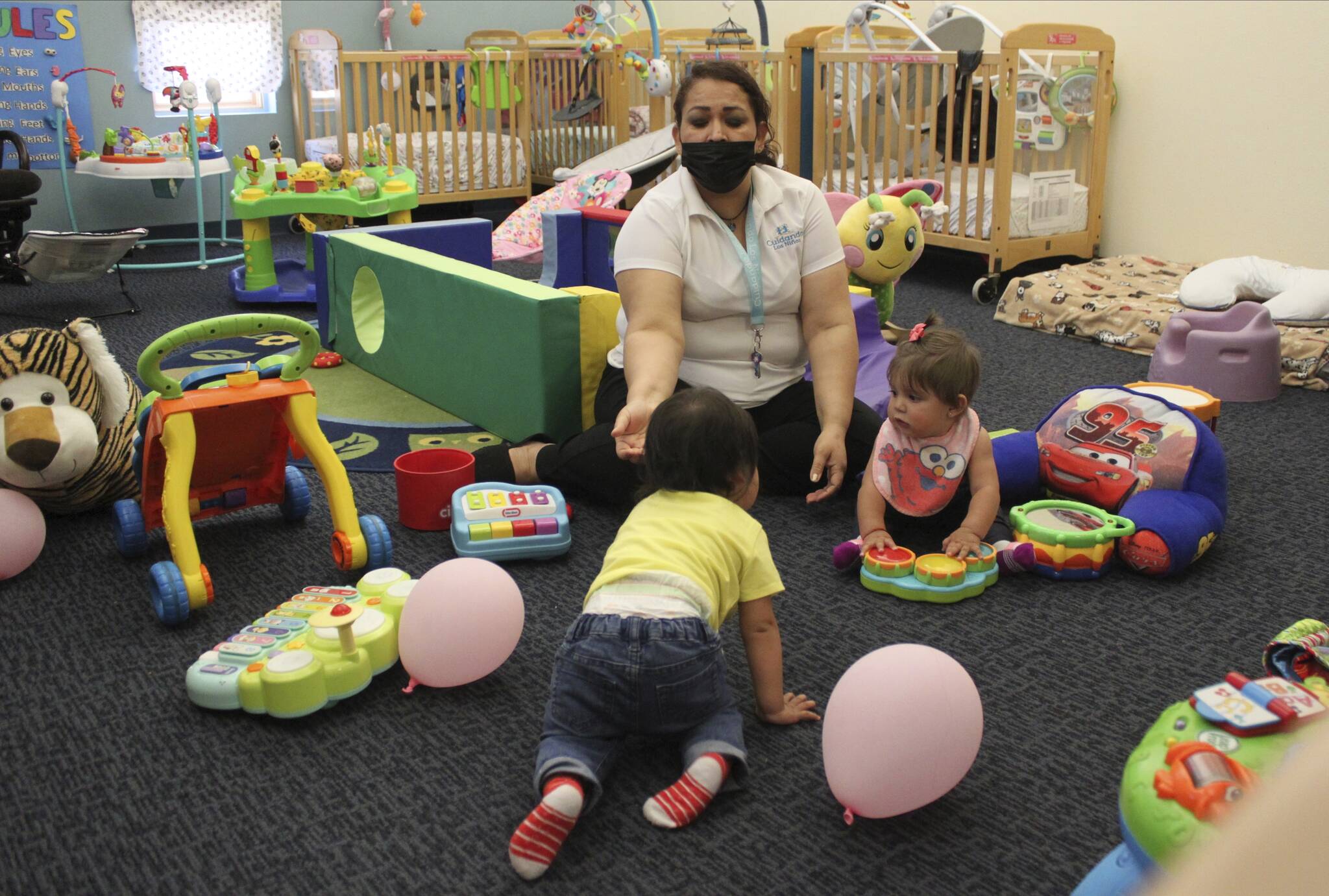With 15 years of experience helping families find child care in Alaska, Stephanie Berglund, CEO of thread — Alaska’s child care resource and referral network — says she is still waiting to meet a family who found child care that checked all the boxes that early educators say are critical components for care.
“I have yet to meet a family that found child care that was accessible, affordable and high quality,” she told the Empire in a Monday afternoon phone interview. “Even if families have choices, it’s tough. Even if they afford it, maybe they can’t get in, or the one that’s available is across town or not near a bus line. It’s a major, huge challenge for families.”
That experience squares with a recent report by the U.S. Chamber of Commerce Foundation, which found that parents of young children in Alaska face significant barriers to finding affordable, reliable child care.
The report, called “Untapped Potential in AK” found that 61% of Alaskans live in “child care deserts,” and 77% of parents missed work in the preceding three months due to gaps in child care.
Berglund said she sees the struggle first hand as she leads an agency that serves as a child care resource and referral network to increase access to high-quality child care and early childhood education in the state.
“The report is a helpful lens,” Berglund said. “It’s a broken business model; thread feels strongly that we need collaboration from employers and the government to support a stronger system.”
[Report: 61% of Alaskans live in childcare deserts]
She said the report shines a light on how child care concerns intersect with work, which is an area that typically has not garnered much attention.
“We knew it was affecting families’ options,” she said. “But, we didn’t know how much. We were proud to partner with the state Chamber of Commerce.”
Last week, Kati Capozzi, President and CEO of the Alaska Chamber, told the Empire that child care concerns top the list of concerns among her members these days.
“This really limits Alaskan’s ability to find and keep work long term,” Capozzi said.
Berglund said that thread offers families support as they navigate childcare concerns and is focused on creating better outcomes for Alaska’s young children by supporting families and early childhood educators.
“We have a database of licensed and regulated child care programs that meet health and safety standards,” she said, adding that childcare that offers greater continuity helps alleviate stress for families, freeing parents to focus on work.
She said thread serves about 10,000 families a year and spends a lot of time helping families and providers learn more about the components of quality childcare. She said thread also conducts parenting workshops and hosts a hotline where parents can ask questions that don’t quite rise to the level of calling a doctor, she said.
“Right now, we are offering a lot of information about coping and support,” she said.
A host of challenges
Berglund ticked off a list of challenges that child care providers face, including the struggle to find a space to operate, which she said is especially difficult in Juneau.
“Space is hard. You need adequate playground space,” she said, noting that the City and Borough of Juneau and the Juneau Economic Development Council both do an excellent job trying to assist and provide resources.
Berglund said that in Juneau, pockets of the city tend to lack access to care with some neighborhoods offering more options than others.
However, she said that infant and toddler care is the most difficult to find because of the ratios needed to care for children in that age range.
Overall, Berglund said that while 95% of Alaska’s child care providers are operating, there are about 13% fewer providers than there were before the pandemic. In addition, the programs that are open are often not operating at full capacity–frequently due to a lack of staff.
“Child care is super expensive for the facility. They need a certain square footage. They have to meet health and safety requirements–including things like small toilets and full kitchens. They have to provide all things needed for health and safety. But, the number one cost is still personnel.”
She said that childcare jobs are often entry-level positions that don’t offer benefits.
“The facility costs, utilities, and insurance fees are all fixed. The one area with flexibility is staff costs.” She said that many childcare providers want to pay their staff members more but can’t afford to do so.
“The market can’t bear anymore,” she said. “The true cost of providing care is more than families can pay.”
In Juneau, the cost of care for a young child can take a bite out of a family’s budget. According to local operators, the monthly cost of full-time care for a baby is between $1,053 and $1,285.
Looking forward
Berglund said that despite the challenges to child care providers and families, she’s optimistic about the future.
“I’m hopeful because I’m an eternal optimist and because more people are talking about childcare challenges. People are more aware of the issue of how critical childcare is to keep Alaska working,” she said.
She said she hopes that action will follow as more business and government leaders recognize the problem.
She cited CBJ as an example of how the government can step in to make a difference.
“The city allocated some CARES money to child care. That’s a great and really hopeful example. We’d like to see more response and action from other businesses, as well as the state, local business and the community,” Berglund said.
She encouraged people to share their views with candidates during the upcoming election cycle for city and state leaders.
“People should share childcare stories with officials during the election process. We have an opportunity to inform candidates about what’s important to us and for people to keep elevating what’s most important to them.”
• Contact reporter Dana Zigmund at dana.zigmund@juneauempire.com or 907-308-4891.

